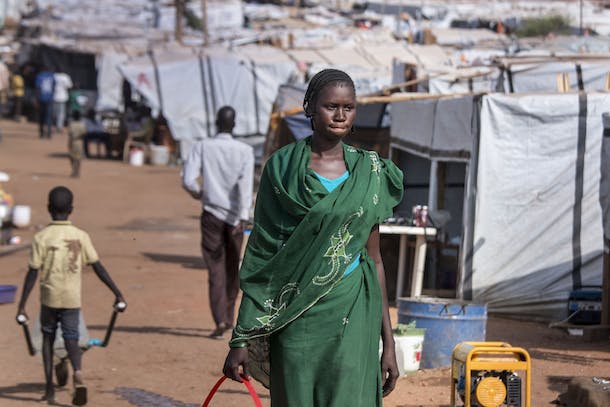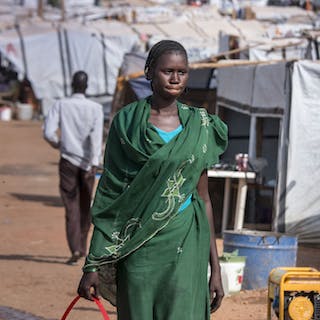
We are in the midst of what the United Nations has called the largest humanitarian crisis since World War II. The threat of famine and severe food insecurity in Somalia, South Sudan, Yemen, and Nigeria mean that 20 million people – more than the population of the entire state of New York – are facing starvation and the ripple of consequences that come alongside it.
The UN is responding: Agencies across the UN system are coordinating to mobilize support for the countries and people at risk, from the World Food Programme delivering critical food and medical supplies, to the Food and Agriculture Progamme supporting rural families and agriculture activities, to the Office for the Coordination of Humanitarian Affairs mobilizing funds and urging greater access to deliver humanitarian aid.
But crises like these are not gender neutral – and that’s why the UN Population Fund (UNFPA) plays a critical role in humanitarian response. Girls, boys, women, and men experience disaster differently. Girls and women have the least power and status, and often at times of crisis, their basic needs are deprioritized or neglected, and the fulfillment of their essential health and rights – including the ability to plan their family and futures – is left by the wayside. These rights are not only fundamental for a woman to survive in a crisis, they are critical in helping her and her family rebuild their lives afterwards – and eventually thrive.
The girls and women facing these looming “four famines” are no exception. Their sexual and reproductive health and rights are at risk every step of the way. In many places, access to family planning services and information is limited or nonexistent for girls and women who wish to delay or prevent pregnancy. If and when a woman does become pregnant, her health and that of her future child are at risk: Women who are on the brink of starvation are at greater risk of pregnancy-related complications, death, and disability. In the midst of conflict and famine, accessing quality medical care is difficult or impossible. In South Sudan, UNFPA estimates that more than a million women of reproductive age are in need of humanitarian aid and, of these women, almost 200,000 are pregnant. In Yemen, some 3 million women and girls of reproductive age need aid, and more than 500,000 are pregnant women who are not getting proper nourishment and do not have reliable access to prenatal care. Globally, 61% of maternal deaths worldwide occur in fragile states, many of them affected by conflict and recurring natural disasters.
“In a country that struggles with one of the world’s highest maternal mortality rates, severe hunger due to famine could increase risks during pregnancy and childbirth,” said Esperance Fundira, UNFPA Country Representative for South Sudan. “With increases in premature or low-birth-weight babies and severe postpartum bleeding, the process of giving life becomes even more likely to result in death.”
Pregnant women and new mothers who are weakened by malnutrition are also at greater risk of contracting deadly diseases. In Yemen, where ongoing conflict has spurred severe food insecurity and compromised health and sanitation systems, a cholera outbreak is spreading quickly, putting an estimated 1.1 million malnourished pregnant women at risk. Women and girls in these countries facing famine, conflict, and displacement are also at increased risk of other crisis-related threats like gender-based violence, HIV infection, forced sex work, or early marriage.
“In the South Sudanese conflict, women and girls are raped, forced into marriage and prostitution to survive. Single women, female-headed households, adolescent girls, elderly women, women with disabilities, and children are at particular risk,” Fundira added.
UNFPA works to address the needs of girls and women facing conflict and famine and to make sure the protection of their health and rights are included alongside other essential responses like food and shelter.
It supports maternal health clinics, which are outfitted with essential personnel and equipment to aid in a safe pregnancy and delivery. It works to prevent gender-based violence and ensure women have equal access to food, health facilities, and other crisis response services. And, alongside these urgent needs, UNFPA looks toward a longer-term goal of strengthening the health systems in these countries facing conflict and famine, from offering free surgery for women suffering from obstetric fistula in South Sudan, to providing midwifery training to bolster the country’s contingent of skilled birth attendants.
UNFPA makes sure a response for women and girls happens no matter what – working with local authorities, NGOs, and others on the ground even when international partners are evacuated from a crisis, all in culturally-sensitive, respectful ways that affirm the dignity and rights of every person even in the worst of circumstances.
This work is an investment with clear returns: When our rights are fulfilled, we can educate and feed our children, reinvest in and strengthen our families, and generate more stable, prosperous communities.
In the midst of conflict, displacement, and famine, UNFPA is there to offer help and hope for girls and women. But it needs our support. We must act now to help sustain the humanitarian response of the entire UN system – and encourage responders to prioritize the critical and specific needs of girls and women affected by the four famines.
Learn more about the Universal Access Project and get involved at www.universalaccessproject.org.
[Photo: Petterik Wiggers/Panos Pictures]

